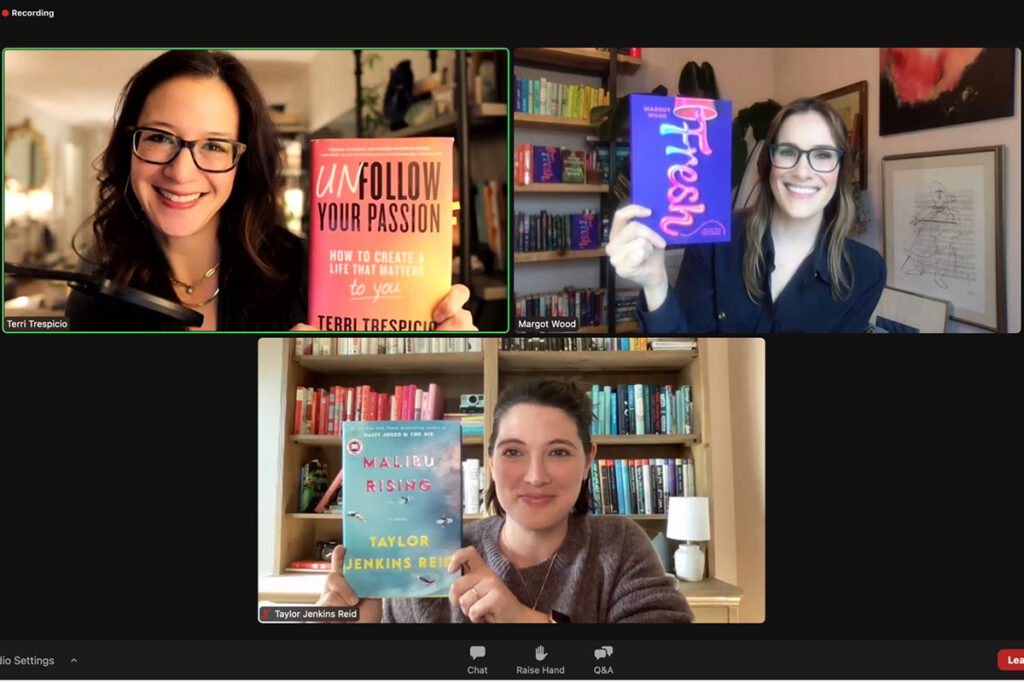Alumnae Authors Share Adventures in Publishing

How do authors publish their stories? What is the “path to getting published”? Is there only one?
Taylor Jenkins Reid ’05, author of New York Times-bestselling novels The Seven Husbands of Evelyn Hugo, Malibu Rising, Daisy Jones and the Six, among others, answers these questions with a frank, yet honest, remark: “I didn’t know what I was doing.”
Jenkins Reid was candid about her writing and publishing process during the latest installment of the Emerson Alumni Association’s Emerging Conversations: Learning for Life series, which explored the process of writing a book, sending manuscripts to agents, and navigating the publishing industry and coming from different professional backgrounds.
In addition to Jenkins Reid, the conversation featured Margot Wood ’08, author of Fresh and founder of Epic Reads, and was moderated by co-creator and original host of Emerson’s alumni podcast, Making It Big in 30 Minutes, Terri Trespicio, MFA ’02, who recently published her first book, Unfollow Your Passion: How to Create a Life that Matters to You.
Watch The Path to Getting Published (must have an Emerge account)
E
The session was followed by a quick Q&A where authors Jenkins Reid and Wood answered questions from members of the Emerson community about how to use your identity and experience in storytelling, the variety of ways to approach the publishing process, and recognizing how and where the publishing industry can improve and make more space for diverse voices.
On finding your own path (to writing):
Margot Wood: I’m ADHD, I’m dyslexic, and I never developed the skill of reading until I was an adult. I graduated in 2008 during the recession and I couldn’t get jobs in my marketing field. I got the idea to write by working in the [publishing] industry, because I didn’t think I was going to write. I didn’t take any writing classes besides the required ones that marketing majors have to take, so I just never thought that I would write until I started working on a bunch of books. You read hundreds and hundreds of books a year, and at some point, you think, I can do that. It took a really long time, but I did it. One of the things they say in marketing is don’t reinvent the wheel.
Taylor Jenkins Reid: I didn’t study writing in college. I bounced from job to job in casting … there was something about it just wasn’t right. During that time, I started writing emails to my friends about things happening to me in Hollywood. I would write these stories and send them to people, and I started having the impulse to write without having anything to write about. You have to try things. You have to be willing to fail.
On protecting your work while accepting feedback:
Wood: I don’t really consult with anybody anymore. I didn’t have any beta readers for Fresh, it was just my agent, and I would occasionally send her stuff. The second I start inviting other voices in my head I start second-guessing myself and I slow down.
Jenkins Reid: I have a lot of people I consult. I have done the opposite of Margot in that I talk to my agent and husband, who is a screenwriter, a lot. When I’m thinking about an idea, I talk about it with a lot of people, but the thing that I try to remember is: Nobody knows anything. If you fail, you will have failed doing something you really wanted to do.
On diversity in the publishing industry:
Terri Trespicio: We are talking with two white women here, and so the question is, well, maybe they had it easier. Let’s say you’re a woman of color and you want to find an agent who represents and perhaps is a woman of color – who else does that agent represent? What types of books? I think, we need to be good literary citizens if we want to be in that world. You have to be reading each other’s stuff, supporting other writers, and be aware of what’s being published.
Wood: Publishing is so white, just from the staffing perspective. It’s super ableist and straight and cisgender. It is a lot easier for white women to get published than it is for women of color to get published. It [can] change at a consumer level; people putting their money towards supporting Black authors and authors of color. It has to start changing at the publishing level: They have to start making sure that more marketing money is going towards the books that are written by people of color. We as readers and consumers need to make sure we’re supporting authors of color by buying their books.
Jenkins Reid: There are a lot of things that we [as white women] don’t have to deal with in publishing. I have a friend of mine who is a Black author, and her first question was should I make my main character like me, or should I make my main character white? Because that may sell more copies. I’ve never had to face that question. My main character can always look like me. So, there are a lot of ways that Margot and I don’t know what it’s like to be a woman of color in this industry.
The next Emerging Conversations installment will be Professional Burnout: Reclaim Your Work Mojo without Losing Your Mind, on Wednesday, April 13. Register on Eventbrite.
Categories